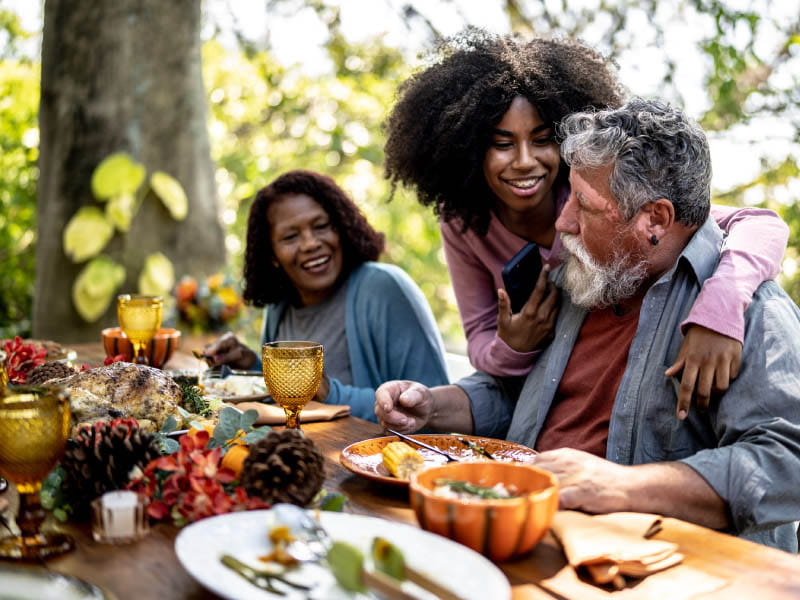Ideas for keeping Thanksgiving healthy – and happy
By Michael Merschel, American Heart Association News

The turkey is roasting in the oven. The pies are cooling on the counter. And you may be telling yourself, "Thanksgiving Day is no time to be overly rigid about what I'm eating."
Health experts say – you might have a point.
"I don't want people overthinking their relationship with food during Thanksgiving, when the holiday should be about friends, families, being thankful and counting our blessings," said Dr. Colleen Spees, an associate professor of medical dietetics at Ohio State University College of Medicine in Columbus.
Holidays tend to bring out all-or-nothing attitudes about eating, said Krystal Dunham, a registered dietitian nutritionist in Tulsa, Oklahoma. People are either "YOLO! It's the holidays! I'm going to let all the rules go!" or "It's the holidays, and I'm not touching anything unless it's celery."
"And I think there's a way to exist in the middle," Dunham said.
That middle ground allows for enjoyment, peace of mind and health, she and Spees said. And while some people, including those with diet-related medical conditions such as diabetes, might require more thoughtful planning, everyone can make simple, healthy last-minute choices that enhance the day.
Among their suggestions:
Don't skip breakfast
Eating to prevent overeating might seem counterintuitive, but starving yourself in the morning can lead to trouble later.
"A lot of people get into a habit on holidays of saving room for a big meal," Dunham said. "But a lot of times when we're doing that, we're showing up to a meal over-hungry. So, then we end up eating past the point of comfort, and we're miserable for the rest of the evening."
A simple breakfast – a bowl of cereal or oatmeal with some fruit, or granola and low-fat or nonfat yogurt high in protein – "helps us make more intentional decisions throughout the day," she said.
Think ahead about how you'll eat …
Most of us know what to expect from our family's traditional meals, Spees said. So have a plan for the hurdles. Visualize filling your plate with whole grains and colorful fruits and vegetables, she suggested, as recommended by the American Heart Association and in the federal Dietary Guidelines for Americans.
The basics of healthy eating are the same regardless of the day, Dunham said. Fruits, vegetables and whole grains are full of fiber, which helps regulate blood sugar and has other heart-healthy qualities. "And fiber usually helps us feel fuller a little bit longer," she added.
… and drink
Alcohol can be one of the biggest holiday challenges for adults, Spees said. Once people start drinking, "their inhibitions go out the door, often along with health behaviors."
If drinking is typically part of your holiday celebration, pace yourself by diluting spirits or making wine spritzers, Spees suggested. Instead of downing consecutive cocktails, alternate by drinking water with a little lime in between. You can also try a mocktail, she said, or just fill your glass with unsweetened sparkling water or iced tea. (The federal dietary guidelines say that people who don't drink shouldn't start and that drinking less is better for health than drinking more.)
Don't trick yourself
When it's time to carve the turkey, many prefer white meat because it has less fat.
"People think, 'Oh, I'm choosing a healthy option,' and then they throw gravy all over it," adding saturated fat and sodium, Spees said.
So, keep your focus on the whole plate, Spees emphasized, and keep portions reasonable. You can leave room for a taste of traditional Thanksgiving foods that are salty and fatty, especially if that's outside your usual routine.
"It's OK to have a few bites," Spees said. "You don't need a huge serving."
Room for dessert?
The same thinking applies to dessert, Spees said. If you're going to have pie, make it a small piece, and go easy on the whipped cream. Or opt for fresh fruit instead.
Dunham said it's possible to enjoy desserts without going overboard. But holiday meals highlight another aspect of healthy eating, she said, that goes beyond physical nourishment.
"Cultural foods and traditions are really important," she said. "And I think sometimes cultural foods nourish our bodies and souls just as much as foods do physically."
So, when the sweet potato pie comes around, she'll be having a slice. "It's a Thanksgiving thing for me," she said.
It's one day out of the year, Dunham said. "It's not going to make or break any of the progress that I've made in my health thus far."
Make movement part of the plan
Physical activity, even a little bit, is a good idea any day. It can lower cholesterol and blood pressure, help maintain a healthy weight and lower your risk of having a heart attack or stroke.
A little group exercise can shift the day's focus in a fun and healthy way, Spees said. "It really prioritizes what Thanksgiving is about, versus the food."
So, take a walk around the block with grandma, or go play with the kids in the backyard, Spees suggested.
Or try dancing, Dunham said. "Our family had a 'Soul Train' line last year."
Remember what you're there for
Little choices do matter to health over time, Dunham said. And understanding carbohydrates, proteins and fats are all important for daily meals.
But holiday meals are more, she said. "I think joy is a great component to a plate, especially when it comes to Thanksgiving," Dunham said. And meals that serve up a side of joy "are going to be meals that are going to be filling and satisfying, regardless."
Spees also will be thinking beyond the kitchen.
"Enjoy the day," she said. "Focus on your relationships with people. Life is short. Enjoy the day."





